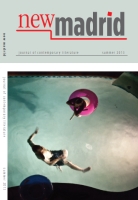Call for Submissions from New Madrid, Winter 2014 Issue: The Great Hunger
New Madrid is the national journal of the low-residency MFA program at Murray State University. It takes its name from the New Madrid seismic zone, which falls within the central Mississippi Valley and extends through western Kentucky. Between 1811 and 1812, four earthquakes with magnitudes greater than 7.0 struck this region, changing the course of the Mississippi River, creating Reelfoot Lake in Tennessee and ringing church bells as far away as Boston.
The editor of the New Madrid Journal is Ann Neelon (Senegal 1978-79). Ann is a graduate of the MFA program at  the University of Massachusetts, Amherst and the author of the book Easter Vigil, which earned the Anhinga Prize for Poetry and our RPCV Writers and Readers Award. She has been a Wallace Stegner Fellow as well as a Jones Lecturer in Poetry at Stanford University. She is also the winner of an Al Smith Fellowship from the Kentucky Arts Council, and fellowships from the Kentucky Foundation for Women, the National Endowment for the Humanities, and Yaddo Artists Colony. Ann’s poems and translations have appeared in many magazines, including The American Poetry Review, Ironwood, The Gettysburg Review, and Manoa.
the University of Massachusetts, Amherst and the author of the book Easter Vigil, which earned the Anhinga Prize for Poetry and our RPCV Writers and Readers Award. She has been a Wallace Stegner Fellow as well as a Jones Lecturer in Poetry at Stanford University. She is also the winner of an Al Smith Fellowship from the Kentucky Arts Council, and fellowships from the Kentucky Foundation for Women, the National Endowment for the Humanities, and Yaddo Artists Colony. Ann’s poems and translations have appeared in many magazines, including The American Poetry Review, Ironwood, The Gettysburg Review, and Manoa.
CALL FOR SUBMISSIONS
NEW MADRID, Winter 2014 Issue: The Great Hunger
New Madrid, the official journal of the low-residency MFA program in creative writing at Murray State University, will dedicate its Winter 2013 issue to the theme of “The Great Hunger.” In keeping with Irish poet Patrick Kavanagh’s poem of the same title, we invite submissions that revisit the collective trauma of Gorta Mór, the great famine that occurred in Ireland between 1845 and 1852. We are interested in work that explicitly or implicitly addresses such questions as why the Irish famine resulted in profound and long-lasting social and cultural catastrophe; how the Irish developed coping mechanisms in the face of such devastation; and to what degree the famine became a hidden wound in succeeding generations of Irish and of those who emigrated from Ireland.
We are also committed to investigating to what degree similar questions are relevant to famines that have taken place outside Ireland. While hunger is personal, often verging on the incommunicable, as does all bodily pain, famines have been accompanied by vast administered systems of machination and belief-in the pieties of British empire that framed the Great Famine of 1876-78 in Southern India, or in the background to the Great Ethiopian famine of 1888-1892, inextricable from the decimating effects of the rinderpest virus introduced by the heads of cattle accompanying the Italians in their campaign against Somalia. Mao’s Great Leap Forward led to an estimated 40 million starvation deaths. The hunger for greatness (which we recognize as a desire for acquisition, as “ambition” itself) has been and remains inseparable from histories of mass deprivation.
Our purpose is also to use the Irish famine as a touchstone for the exploration of issues of food scarcity today. Thus we also invite contributions that investigate hunger as a contemporary phenomenon, for example, as a product of the current world-wide recession; of migration caused by military conflict; of the drought and flooding linked by many experts with climate change; and of the politics connected with food insecurity, food sovereignty, etc. Other issues of possible interest include the growing and eating of food, the relationship between hunger and aesthetic experience, the use of hunger as metaphor (hunger for God, hunger for intimacy, hunger for community, etc.), the circumstance of the hunger strike (and force feeding as an official response to it), and the paradox of the need to satisfy hunger in order to explore “the great hunger” as a theme. As Virginia Woolf said, “one cannot think well, sleep well, love well, if one has not dined well.”
All submissions should be of interest to the general reader. Please do not submit scholarly articles. Submissions will be accepted between August 15 and October 15. Please note: we accept online submissions only. All submissions must be sent via Submission Manager, which can be accessed from our website at www.newmadridjournal.org.

Summer 2013
No comments yet.
Add your comment